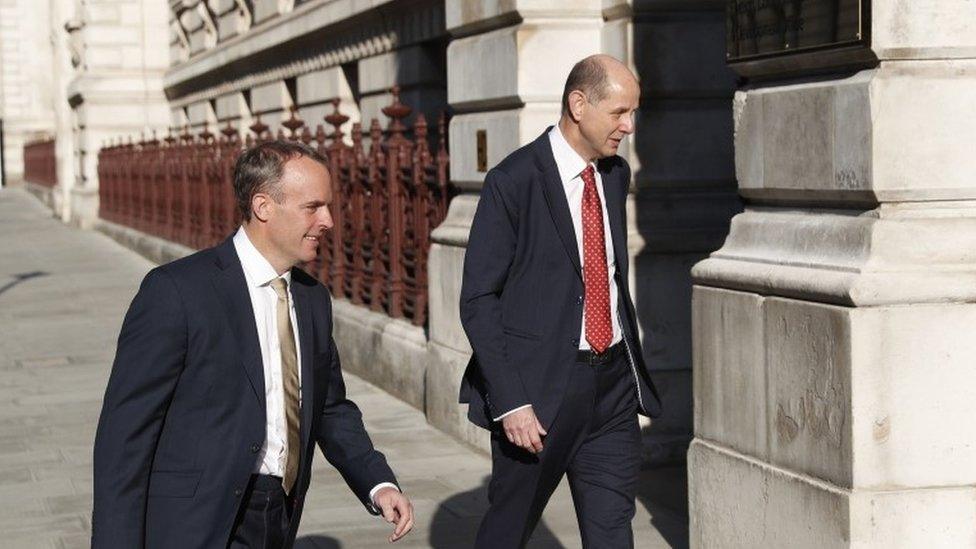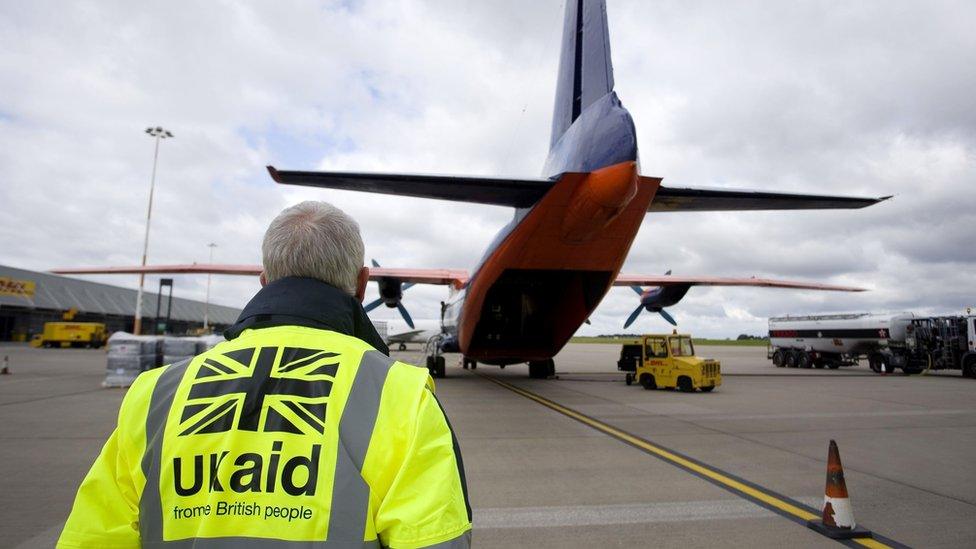UK won't cut foreign aid budget - Dominic Raab
- Published

Dominic Raab and his top civil servant Philip Barton arrive at their new department
The UK government remains committed to spending 0.7% of national income on foreign aid, Dominic Raab has said.
The foreign secretary dismissed as "tittle tattle" reports that the £15bn aid budget could be cut to pay for more defence and intelligence spending.
Press reports suggest Chancellor Rishi Sunak will cut aid spending to help pay off rising debts in his Autumn budget.
But Mr Raab said the 0.7% target was a manifesto commitment that was written into law.
His promise came as the newly-merged Foreign, Commonwealth and Development Office began work, with a pledge to protect "the world's poorest" from coronavirus and famine.
The new department is opening after No 10 decided to combine the Foreign and Commonwealth Office with the Department for International Development (DfID).
Asked if the 0.7% target would survive the merger, Mr Raab said: "Oh, absolutely."
He added that the development expertise the UK has got will be "the beating heart of this new department".
Cyber weaponry
The government is carrying out a review of defence and security policy, that is due to report back in November, and is also gearing up for the comprehensive spending review, external, which will set departmental budgets for the next few years.
According to The Times, external, Rishi Sunak is arguing that the Ministry of Defence's plans for advanced cyber weaponry and AI-enabled drones must be paid for out of the aid budget.
Mr Raab said: "Well, there is loads of tittle tattle, rather colourful, in the media and I am not going to prejudice the comprehensive spending review."
He added that the government was committed to helping the poorest around the world and "making sure we link up aid with our wider foreign policy goals".

The UK is one of the few countries to meet the UN's 0.7% aid target
Mr Raab has announced a £119m fund to tackle coronavirus and famine to mark the launch of the new, merged department.
The money will be targeted in Yemen, the Democratic Republic of Congo (DRC), Somalia, Central African Republic, South Sudan, Sudan and West Africa's Sahel region - all places where the outbreak has worsened conditions for people already struggling with extreme hunger, wars and/or climate change.
The foreign secretary also confirmed he would be appointing Nick Dyer - a director general at DfID - as the UK's first special envoy for famine prevention and humanitarian affairs.


The abolition of the Department for International Development may have been driven by political pressure from within the Conservative Party.
But the government argues that its merger with the Foreign Office will mean better, more joined-up policy.
Foreign Secretary Dominic Raab said that by combining its diplomatic strength with its expertise in foreign aid, Britain could not only tackle global challenges, but also protect its interests.
Critics fear the new Foreign Commonwealth and Development Office could mean the government weakens its commitment to spend 0.7% of national income on foreign aid.
But Downing Street insisted there'd been no change to that policy.

The two departments have a history of being merged and split up again, and the move to bring them together has long been mooted in Conservative circles.
Tory MP Harriet Baldwin - who held joint roles across the FCO and DfID - said it was "really important to combine them".
She told BBC Radio 4's Today programme: "[The move] will really increase the impact of our diplomatic clout, as well as our development expertise across the world."
But Labour MP Hilary Benn, who was the international development secretary under Tony Blair, said he thought the merger was a "mistake" and questioned Mr Johnson's understanding of the department.
He told Today: "The proof will be in how this new department develops and unfolds, but I think it will lead to less respect for what we are doing."
'Giant cashpoint'
Boris Johnson announced the merger in June, telling MPs it would ensure aid spending better reflected UK aims and that it was a "long overdue reform".
He said UK aid spending had "been treated as some giant cashpoint in the sky that arrives without any reference to UK interests".
But the PM pledged DfID's budget - which at £15bn last year dwarfed the £2.4bn spent by the Foreign Office - would be maintained
Mr Johnson's decision was criticised by three previous prime ministers - Conservative David Cameron, and Labour's Gordon Brown and Mr Blair.
Boris Johnson announced the merger to the Commons in June
Mr Cameron said it would mean "less expertise, less voice for development at the top table and ultimately less respect for the UK overseas".
The Commons International Development Committee also called the move "impulsive", saying the world's poorest "will pay the greatest price".
Labour leader Sir Keir Starmer pledged to reinstate DfID if he were to win the next general election, saying the merger was "the tactics of pure distraction".